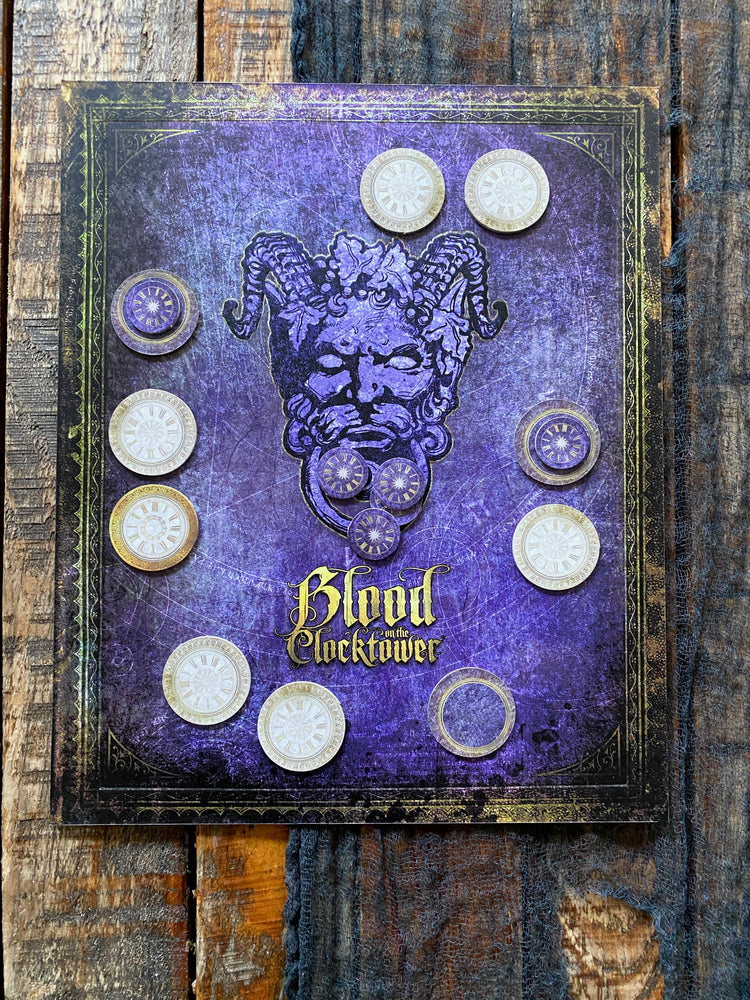Table of Contents
Blood on the Clocktower has been somewhat of a phenomenon. Before the game launched after a successful Kickstarter, there was a print-and-play version released which was quite popular online when the government closed outside.
My first experience of playing Blood on the Clocktower was online, it was what prompted me to reach out to The Pandemonium Institute. Please read any of my other reviews to know that being gifted a copy of a game really does make no difference to what I will say about it.
Playing online is a very enjoyable way to play and you will be able to get far more games under your belt like this, however, and it’s something I will go into far more detail about later, playing in person is a far more visceral experience.
Before we go further let me address those of you who have never heard of Blood on the Clocktower and explain what the game is.
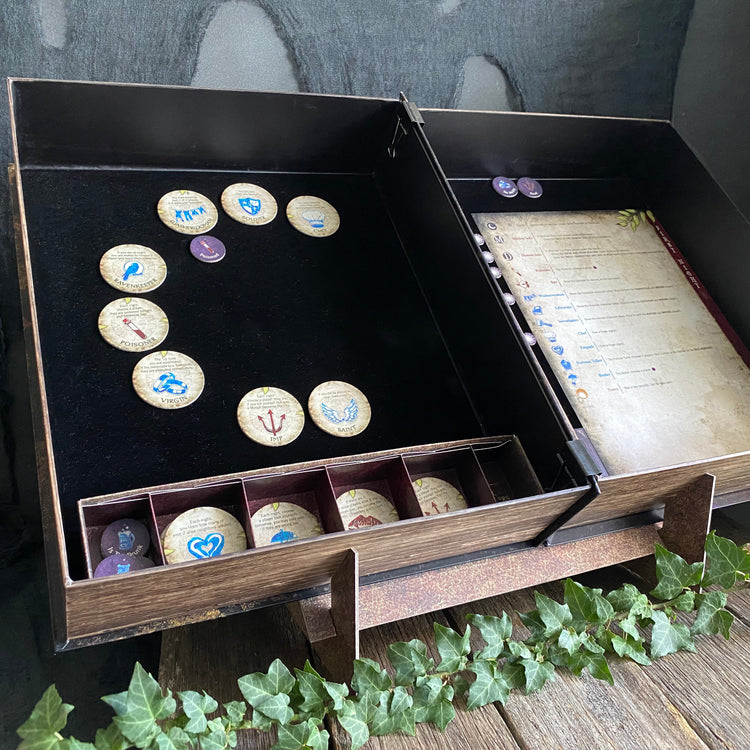
Blood on the Clocktower is at its simplest a social deduction game for between five and twenty players with a good and evil team pitted against each other, the townsfolk (the good team), are trying to find and execute the demon. The evil team are trying to survive until the end of the game.
Defining a game like Blood on the Clocktower with a simple sentence or two belies so much of what it is to play.
Let me preface everything from here on out by saying that playing online is excellent, easy and above all fun. If you have no option to join a live game then playing online is one of the best gaming experiences you can have.
The online version of Blood on the Clocktower means you can hop between rooms for conversations and the storyteller can more easily nip in and out of rooms to listen in and assure the game runs smoothly.
Please, play the online game, it is incredible and the experiences are memorable, however, if you ever have the chance to play in person, get ready for the best game experience you will ever have.
Before I started writing I was in sales for 22 years. I was trained to read body language and use neurolinguistic programming to control and spot the subtleties of human behaviour.
I played a few games with my nephew, I know him, I know when he is lying. I can do the same with most people. There are signs when you are not telling the truth or when you are being deceitful.
Why then do I have no idea what the hell is going on when I play Blood on the Clocktower?
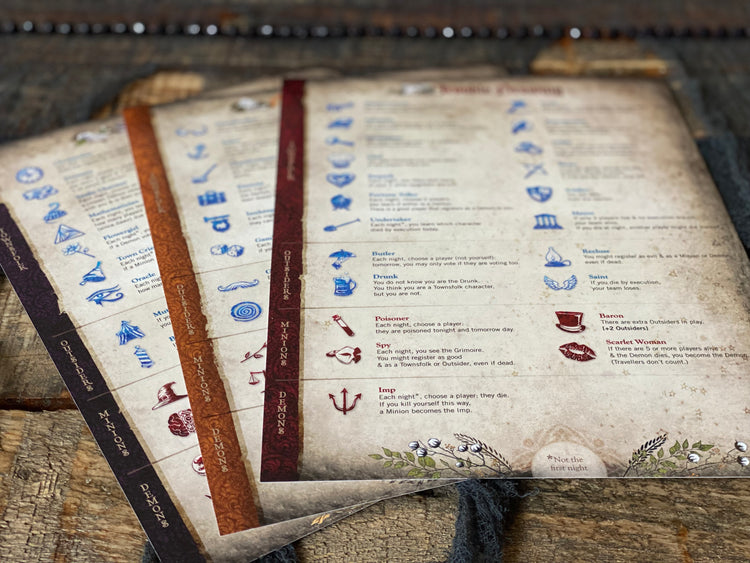
Something about the nature of this game, where hardly anyone is telling the truth, where you are trying to hide something too seems to make everything everyone says look deceitful.
Even when I was telling the truth my mouth was dry and I couldn’t stop my hands from shaking. It would have been fine but I was sat in a room with 12 people who wanted to execute me and I was an adult playing a game.
Playing as the Storyteller
I am starting here because this is possibly the most complicated role in Blood on the Clocktower and, on the surface, appears to have little to do with “playing the game” but in practice is as much fun as being in the town square with your job being to manage the other players’ fun.
Before the game begins there is a fair amount of prep and it can be intimidating the first few times you manage a game.
There are multiple roles for you to manage, devising plausible bluffs for the evil team as well as trying to balance the roles so that no one team has a clear advantage before the game begins.
When a Blood on the Clocktower game is running there is a lot to do, from waking the villagers and finding out who is being killed you then have to, on the fly, work out who is winning and try to balance the game by giving only relevant information to some players. That information could be true or false information and that is something you will need to decide “on the night”.
This is not an easy role and I was certainly overwhelmed the first time I ran a game despite the fact I had played for 30-35 hours at the time.
So, what exactly is involved in running a game? Well, you will need to have a copy of Blood on the Clocktower and that all starts with the contents of the enormous box.
Opening the box.
Blood on the Clocktower comes in a box that doubles as the Grimoire that you will use to manage the game.
The inside of the box is used like a large book and held together with bulldog clips and perched on a cardboard stand.
Lined with black felt the magnificence of the Blood on the Clocktower Grimoire and the secret nature of what it contains not only gives you an instant reference to the state of the game but it feels significant and the tactility of moving the components, knowing who is poisoned, drunk, evil or good, protected etc, made me feel like I was in charge of a war.
The tokens are also felt backed so that the angle of the grim doesn’t allow them to slide. In the copy I was sent I did need to apply some glue to a few of the tokens that the felt had come away from but I think the overall quality of the components is reasonable.
On the subject of tokens, there are a lot, essentially there are three scripts included with suggested roles and this is enough to get your first game up and running and to be able to play any number of more and more complex scenarios.
I would 100% recommend Trouble Brewing for your first few games as a Storyteller. It’s one of the harder scripts to discover information as townsfolk but as a new Storyteller, especially if you have new players, it will run far more smoothly than one of the more complex scripts.
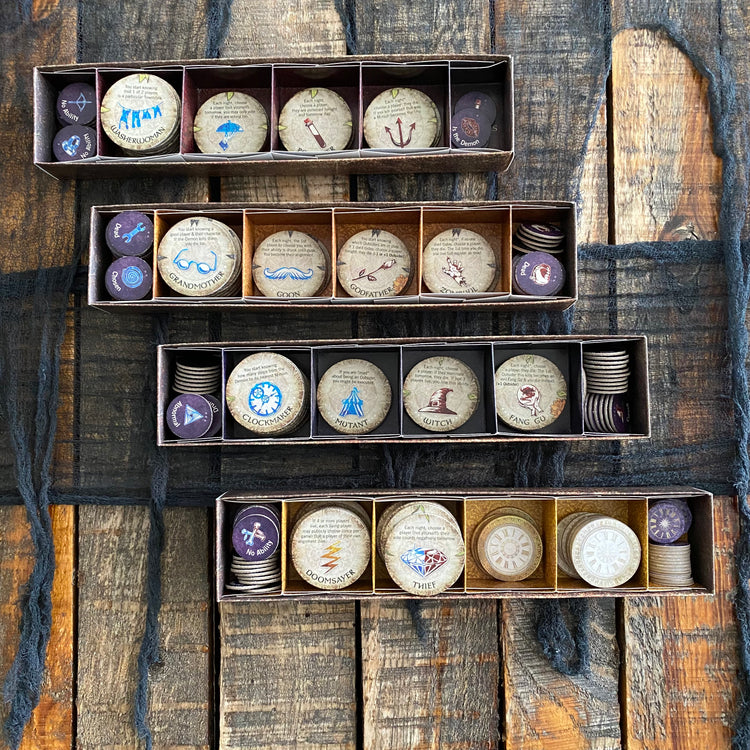
There are also tokens for the players that you will mirror in the Grim and a lot of card stock that will include a list of the standard Blood on the Clocktower roles for each player of the specific game.
If you create your own scripts there is a plentitude of information online for you to print handouts that will be in keeping with the theme.
In the third game I ran I had time to organise the Grim on the fly while people looked through the roles and it was a far smoother experience overall but before you run your first game, I would try to have things ready to go beforehand.
I say this because if you have invested the RRP of £159.99 cost of entry you will most likely be the person running the game and will also want to savour that game yourself.
I can say with a hand on my heart though that running a game is as much fun, possibly more, than playing as townsfolk.
By the third game of Blood on the Clocktower, I was far more relaxed and I enjoyed the storyteller role immensely. Switching from worrying I was going to get it wrong and spoil the fun to becoming the ultimate puppet master rewarding or torturing people with conflicting interests.
Choosing what information to give a poisoned player to advantage the evil team and then watching them converse with someone who has conflicting information is exquisite. It’s equally enjoyable to see people putting the puzzle pieces together and watching them root out the evil team.
Playing as the Storyteller in Blood on the Clocktower is a lot like being the Ghost in Mysterium. Before you play you can’t understand how it could be as interesting as solving the puzzle but once you have been the ghost you can’t wait for the next turn.
In the box then you will receive three Scripts or games. Trouble Brewing, Sects and Violets and Bad Moon Rising.
The Scripts
I wrote a big splurge about each Script and roles therein but realised that this review of Blood on the Clocktower was going to be like a small novel instead of a synopsis that would help you make a purchasing decision. Instead, I have briefly broken down the three scripts that come in the box and will link to a wiki for each which goes into far more detail so you can read as much or as little as you want.
I will say here though that whilst there are three pre-determined setups in the box, you can, and eventually will mix things up as much as you want so in reality the experiences you can create are limited only by your imagination and ability to weave the narrative.
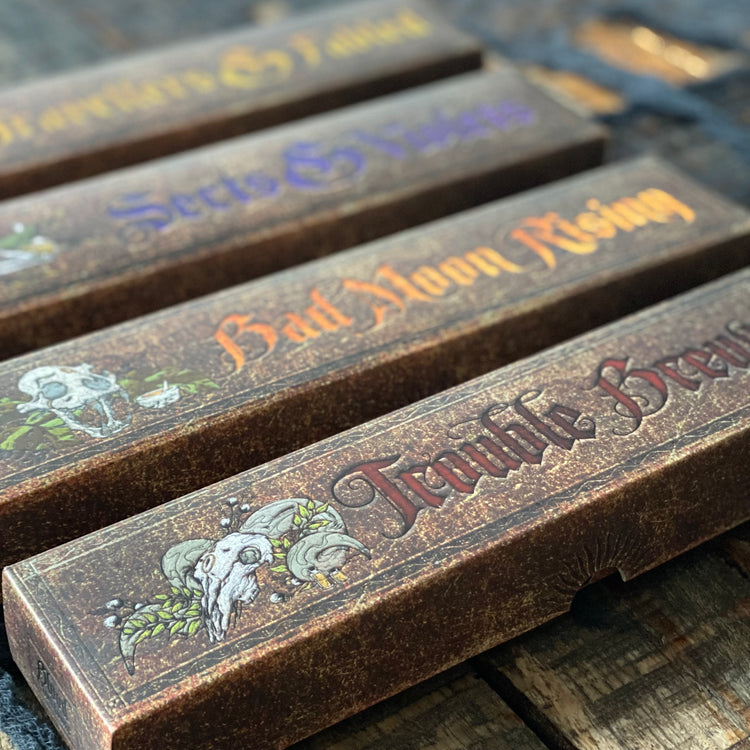
Trouble Brewing
Trouble Brewing has a bit of everything Blood on the Clocktower has to offer. There are characters that gain information at night, some that gain information only when someone dies and a demon that can and will kill each night. Trouble Brewing Wiki Here
Sects and Violets
Easily Blood on the Clocktowers’ most mind-bending script. I struggle to trust anyone during a Sects and Violets game mainly because of the wealth of information you get. Lots of information sure but you cannot trust any of that information unless you verify every word of everything you hear.
There is a lot going on and keeping track of who is on what team and even who you are can change. It’s possibly the most complex of the basic scripts but also the most fun when you get a sense of what could have happened.
Winning as either team is difficult but exceptionally rewarding if you solve the puzzle.
Bad Moon Rising
Everyone dies. I should stop there but in Bad Moon Rising it’s not just demons that kill and more than one person will often die each night. Bad Moon Rising is a blood bath and it’s a great deal of fun to play.
It’s not the easiest of scripts to get to grips with and there is a lot of death but it is very winnable as the good or bad team and like with all the other scripts you will need to play a few times before you feel comfortable.
I want to tell you a little story about a game I played. Please take a look at the linked Wiki for a breakdown of the roles but in short, it was one of my first games. I was playing as the Gambler.
The Gambler must name a player and their role at night and if they are wrong, they die. I waited in the lobby assuming that the evil players would all go off and talk meaning whoever was left I could trust.
I ended up confessing my role to the damn Devil’s Advocate. They told me they were the chambermaid and it would help if we roll swapped as her ability was very useful and the gambler wouldn’t be targeted.
In short, she protected me that night so the next day when I spoke with a good player, I told them that she was the chambermaid and I confirmed it by being alive. I essentially handed the evil team the win.
The ability for the player to instantly recognise the power they had just been handed and then use that to give themselves a rock-hard alibi was impressive and sums up why you can never trust anyone 100% in Blood on the Clocktower.
Blood on the Clocktower is just a social deduction game!
I have heard people say this on many occasions. I spoke to a game group when the game first arrived to see if they fancied a whole night of play and I was told, “we prefer something a little heavier weight than a social deduction game, it’s basically a more complex Werewolf game”.
A Bugatti Veyron is just a car, it’s basically just a complex Go Kart is what I should have replied but I didn’t think of it for a couple of days. I will be ready next time anyone besmirches Blood on the Clocktower. I might call them again.
Yes, deduction and bluffing are a part of the game but there is so much more to consider that I would invent a category of “Social Interaction and Deduction Puzzle Murder Mystery game” or SIADPMM for short.
Sure, Blood on the Clocktower has its roots firmly tucked in the same field as Werewolf, Resistance or Mafia but the fact there is a Storyteller guiding the flow of the game adds an element only a GM can bring to a game.
A good Storyteller will mean your night is fun-filled and thematic, understanding the roles and their interactions means a good Storyteller can mix things up and create chaos. Especially when they start to add some of the experimental roles.
A word of warning here though. Some people can take the whole preamble from Blood on the Clocktower a little too far and this can be as off-putting for new players as a confused Storyteller can be for an experienced group.
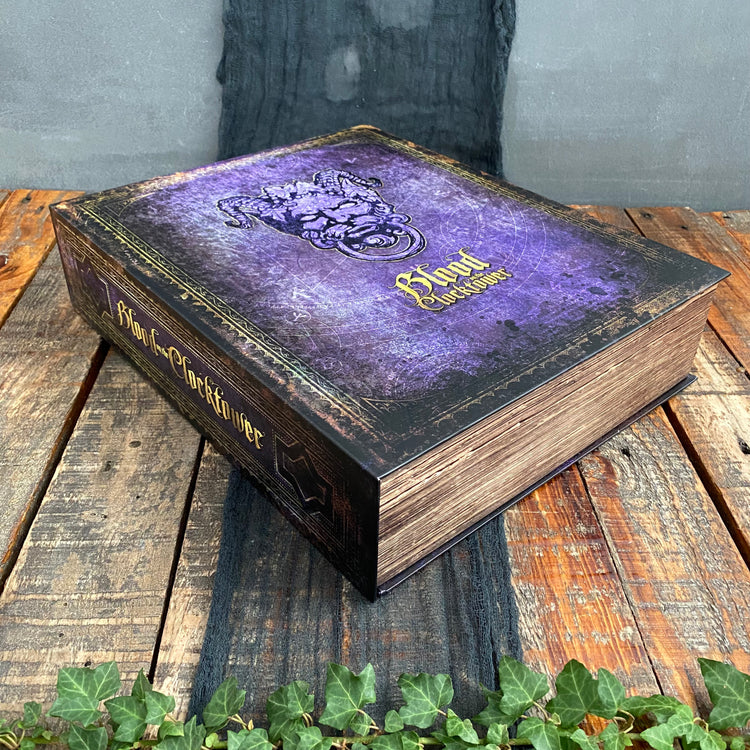
Killing the Demon
During the night the demon will kill however, during the day anyone, including the demon, can nominate to execute someone.
As you will have already seen there are lots of ways that people have to determine the truth, it’s not easy but there is enough information floating around during the conversations to work out who is not telling the truth and more importantly, who is.
It is much easier if you can verify your own information. For example, if you are the grandmother you start out knowing a good player and which character they are. This means you begin the game with a solid ally with whom you can compare the information.
When you are certain you have the right bad guy you can nominate them during the end-of-the-day phase.
Once nominated you to make your case stating your evidence. The nominated player gets to rebuke you and state a case why they should or shouldn’t be executed and then everyone votes.
If no more nominations take place and the vote passes, that player is executed and if they are the demon, the good team win.
Not so fast Nicotine
Wouldn’t it be good if it was that easy? In practice, the minions or the demon themselves would nominate another person and try to get them executed instead.
Judging who is telling the truth is practically impossible immediately. Most games last between an hour and an hour and a half but in a game with eighteen players, I once played a single game that went on for two and a half hours. There was so much laughing and joking it felt like twenty minutes.
The best part about Blood on the Clocktower is this very thing, the social part of social deduction. You can start a game with a bunch of strangers and even though you don’t talk about your personal life at all you get to really know each other. You find the humorous people, the detectives, the serious players and those who have no clue what is going on, all through the rye smiles and their ability to lie.
No one left behind
What elevates Blood on the Clocktower for me is that everyone plays. Everyone has a role that helps or hinders and even when you die you can still gain information. Some roles require your death to gain this information like the Ravenkeeper for example. Other roles like the Grave Digger rely on deaths to gain information which can then verify or disprove information gained earlier.
Dying is not the end of your game either, you keep playing as normal, and you may stop getting the information you were each night but often there is no change to your play except that you only have one vote to use in the town square.
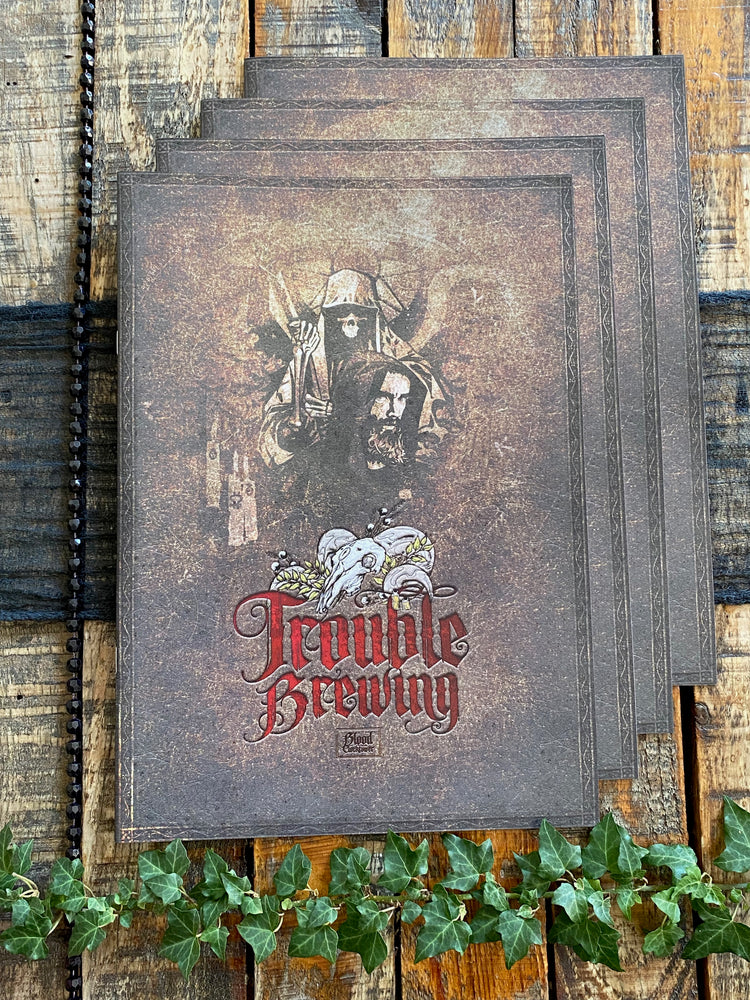
Everyone is equal, are some more equal than others?
Some roles in Blood on the Clocktower as a whole are more interesting than others. I accept that, but a game is what you make it. Drawing tokens at random will see some players get frustrated at their roles.
I don’t understand this as the game isn’t about getting information from the Storyteller it’s about discerning if your information is reliable and solving the puzzle of who is good or evil.
I feel that you cannot make everyone happy but with Blood on the Clocktower, there are often times when I get frustrated at the players who say they had a “good” or “bad” role. I think they have missed the very point of the game.
End of the Game
The game ends when either the demon is executed or when there are not enough good players to achieve the task.
Either way, this is the time the Storyteller will run through the game and you get to find out how they mixed things up, what information they gave drunks or the poisoned and more importantly how close you were to working out what was going on.
This is also a great deal of fun and talking about the game, your motivations and why someone lied to you etc is generally a riotous time, This is when I spend a good deal of time laughing at things that have happened. My favourite is when you discover that you walked away from a situation and claimed that you got away with something only to find out that the other person did not believe a word of what you said.
In Summary
I have to be careful not to regurgitate everything I feel I know about Blood on the Clocktower for two reasons. 1) I don’t want to hit 3000 words in a review and 2) I don’t know that much about Blood on the Clocktower.
In the time that I have played online and the time I have played in person I have spent the equivalent of several days “in-game”. It may seem like a lot but I still feel like I have only scratched the surface of what could be possible in-game.
The best part is, not a single experience was the same. I did not feel like I can when playing some games. That feeling of doing the same thing over and over or that I am just going through the motions and doing the same task for the 20th time.
Every time I have played Blood on the Clocktower, I have laughed, worried, agonised over decisions and more often than not been wrong and trusted the wrong person.
I cannot begin to tell you how much fun you can have with Blood on the Clocktower. Sure, the price of entry is high but I bet most of you are in a gaming group so just club together and grab a single copy you can play together.
This is not only the finest Social Deduction game there is, it is one of the best games in existence and for totally different reasons I love Blood on the Clocktower as much as any of my favourite games.
This review, whilst too long, doesn’t do justice to the joy Blood on the Clocktower will bring and if you cannot find a physical game near you then join Board Game Schedule and play online, you won’t be sorry.

